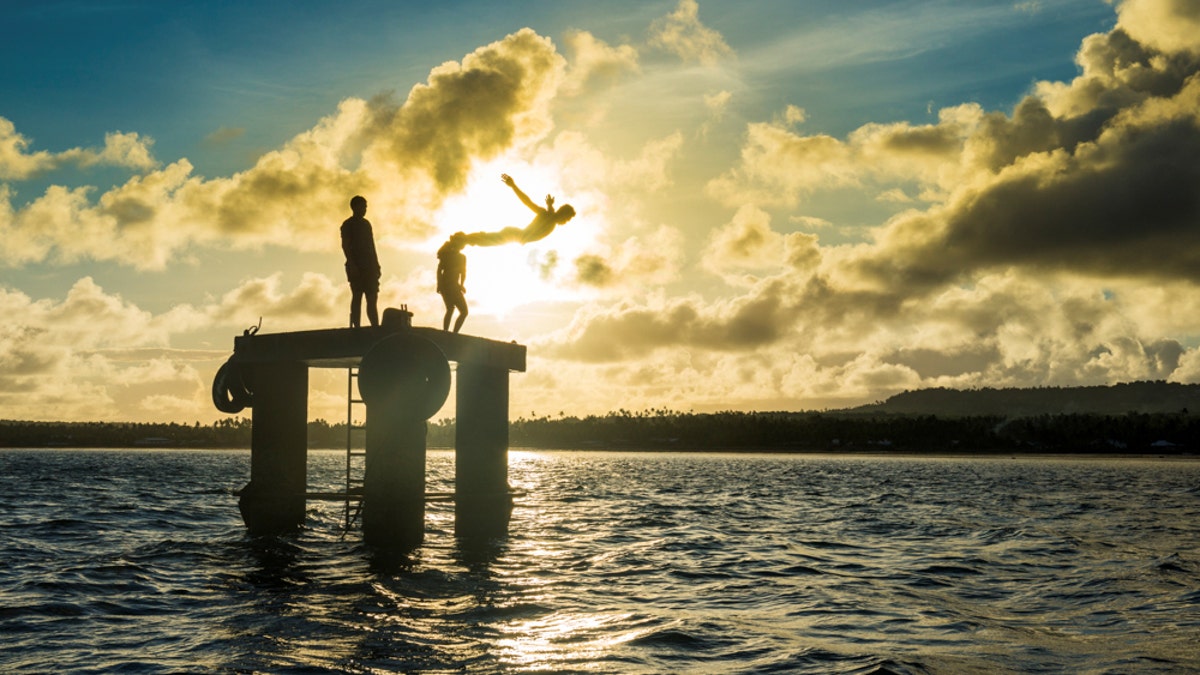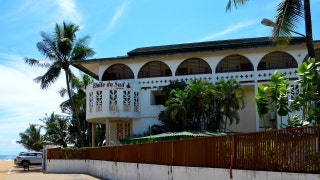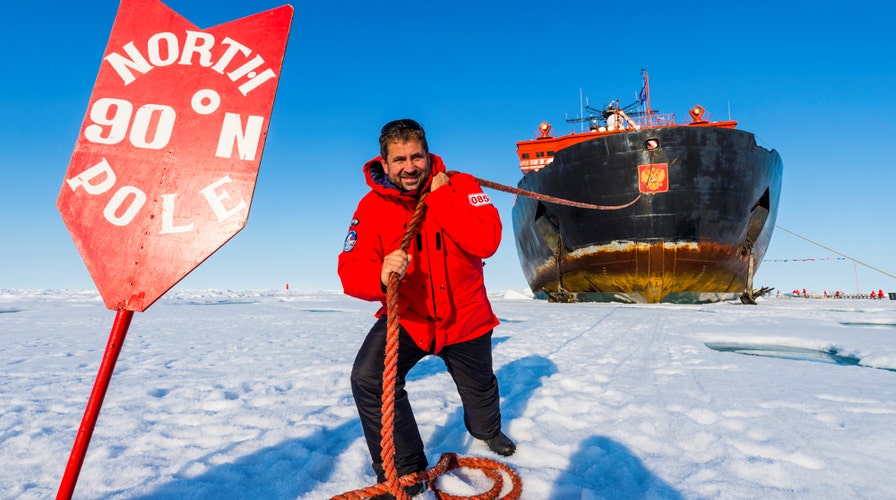What does travel insurance cover?
Thinking of traveling despite the coronavirus outbreak? Here’s what you need to know about travel insurance just in case of the unexpected.
German native Michael Runkel has traveled to every country on Earth and shows no signs of slowing down.
We discuss going to outer space, the coronavirus outbreak, what makes a good travel photo, and why long-term travel with kids doesn’t suck.
Where are you now?
Sitting on a beautiful beach in Ko Lanta, Thailand.
How long did it take to visit every country?
It took 29 years. I finished in Saudi Arabia in 2018. I have been traveling for a total of 31 years, but traveling to every country was never my goal. I am not a stamps-and-stats traveler. I am more interested in having original experiences in the places I visit, but according to Nomad Mania, there are a total of 1,281 regions on the planet. I have been to 1,079 of them, and many more planned over the next 18 months. By this time next year, it’s possible that I might be the most-traveled person alive.

Michael Runkel at the North Pole. (Michael Runkel)
The obvious question I’m sure you get a lot: What first inspired you to travel?
I started reading Karl May when I was in primary school at the age of 9 or 10. He is mostly known for his novels about Apache Chief Winnetou and the American West, but I was really drawn to his tales of Kara Ben Nemsi and his exploits during Hajj through the Middle East. Both my parents were teachers, and we often traveled together when school was out. My grandmother spent a lot of time in Africa and Asia. I think my travel gene came from her.
How hard was it to get on that first flight and where did you go?
My first trip abroad was actually overland by bus from Germany to Syria in 1988. I was just 18. Syria at that time was fantastic. No tourists. Lots to see, lots of culture. It was a very open-minded place, and an extremely welcoming country.
5 AIRLINE FEES THAT ARE WORTH PAYING (UNDER CERTAIN CIRCUMSTANCES)
It’s been said that more people have traveled to outer space than have visited the United Nations’ 193 recognized countries. (At the time of this writing, there are currently 200 verified persons that have visited every country on Earth; 500 have been to outer space). If Richard Branson called you tomorrow and said you have 15 minutes to pack your bag for a Virgin Galactic flight, what would your answer be?
Yes, of course! That would be a unique opportunity. I would love to see the world from outer space -- so long as he is paying.
There has been a recent spike in travelers that have been to every country, mostly Americans. There are about 10 to 20 people that pop up every year that attempt to do it. Many of them seem to me to be more inspired by a personal goal, simple attention, or just out to prove they can do it. They are not really traveling meaningfully, in my opinion.
You now travel with your entire family. Can you talk about the challenges of that? The rewards?
Yes. We are doing 13 months around the world, and now on our Asian leg of the trip into five countries. Last year, I had to break off from them for six weeks by myself for photo work, visiting Russia, Afghanistan and Niger. My wife is from San Diego, and they will visit her mother there toward the end of the trip while I continue on to India.
Traveling with children is a challenge. We have to care for two kids. Our daughter is 4, and our son is 8 months old, but it is worth every second. We get to spend every minute with them, and we get to show them the world. We have been to some extremely remote locations together. In Vanuatu, they were the youngest white-faced children the people there had ever seen. In April, we are planning to go to the Pitcairn Islands, the remotest islands on the planet. Our tour operator tells us that they will be the youngest visitors the islands have ever had. After that, we are headed to the Amazon, then northern Vietnam.

The Traveling Runkels. Pictured: Wife Samantha, son Luca (8 months), Michael, and daughter Sia (4). (Michael Runkel)
WHAT DOES TRAVEL INSURANCE COVER?
Tips for those traveling with family?
Traveling with kids is risky, but not any riskier than back home. It’s important to choose the right times of the year to visit each destination. Right now we are in Thailand during the dry season. In the tropics, you have to visit at a time when there are fewer mosquitoes. Pre-plan where you want to go, get vaccinations, take bug spray and lots of hand sanitizer. When we travel, our children are very popular, and people love to touch them, which is wonderful, but it can be overwhelming. It’s also just as important to not be overly cautious, or you will miss out on a lot of experiences.
Schooling is an issue. Children have to go to school in Germany, it is compulsory by the age of 6. You cannot home-school them. Our oldest does not have to start primary school for two years, so we are taking this opportunity to travel with them now.
Is mainland China part of your Asia itinerary? Do you have concerns about the coronavirus outbreak there?
We had an extensive trip through China planned. It was our next stop. We just learned that the government has shut down all access to the tourist sites throughout the country. Many other travelers I know have also had to cancel their visits. Right now, we are going to head back to Myanmar for an extended period. We are not sure when we might be able to plan another trip there.
Do your children have dad’s travel gene?
I’m not sure about our littlest one yet, but I think my daughter does. She has already been to 40 countries! She definitely likes traveling. We do unusual things, and she has seen things a lot people could only dream of seeing. She is great on long flights, long bus rides. Our recent flight from L.A. to Taipei was 14 hours -- [she had] zero complaints. She loves photography, as well.
8 PACKING TIPS FOR TRAVELERS LOOKING TO SAVE SPACE
I have probably met more Germans on my travels than any other nationality. Is there something about the German culture that makes them want to explore the world more than others?
I guess that is because we have a good social system. Most Germans have 30 days of holiday every year; we have paid parental leave for up to three years and are eligible to receive up to $2,000 per month. Our universal health care is another important factor that contributes to making extensive travel possible. In addition, Germany has a very culturally diverse population, and so your friends and neighbors are from all over the world. That provides opportunities to visit people you know in their native country. The Swedes and the Dutch also travel a lot, but just in smaller numbers.
Now that you have visited every country, tell us about your thinking in choosing another destination?
For me, I would rather go to places that are interesting, especially to photograph UNESCO World Heritage Sites. I have been to 700 of them and I have 400 left to visit. I’m actually going to do a [photography] book about it later this year. These are important places. I’m curious about cultures, peoples and landscapes. By now I pretty much know the world, so I can tell you what it has to offer. I do love remote places due to fewer crowds, but it is usually the beauty of a destination that compels me to visit.

Night falls on the Ennedi Plateau, a UNESCO World Heritage Site, in northeastern Chad. (Michael Runkel)
CLICK HERE TO SIGN UP FOR OUR LIFESTYLE NEWSLETTER
Most harrowing travel experience?
Too many to count. Crawling over unexploded ordnance in a field in Cambodia, or being stared down by an armed militia in Mogadishu immediately come to mind. But the most life-changing experience was a nighttime earthquake on Christmas Day in Bam, Iran, in 2003. I was quick to get out and saved a friend’s life. The two of us managed to save another 10 people from the rubble. Everyone else on our street was killed, tens of thousands of people [in total]. The official death toll from the government was egregiously undercounted.
A country that exceeded your expectations?
One for sure is Myanmar. We were just there, and my third visit. Extremely friendly people. Everyone is so nice, and it is so culturally interesting. Southern Myanmar is completely untouched by tourists. The Mergui Archipelago is a paradise and only opened to tourists four years ago.
A country that didn't meet your expectations?
Cameroon is rough traveling -- especially in the interior -- and the police, the army, the militias, are so corrupt. A real low point. I don’t plan to be back anytime soon.
A country that turned your expectations on its head?
Honestly, I really haven’t experienced any. I usually research a country thoroughly before visiting, and so I generally know what to expect when I arrive.
FOLLOW US ON FACEBOOK FOR MORE FOX LIFESTYLE NEWS
How do you make a living while traveling?
Mainly photography. I try to take as many photos as possible. You have to be a little more prepared and sleep a little bit less. I have a secondary income teaching photography when I am home. I also sell prints on my website.

A Sufi cleric reads from the Qur'an in Herat, Afghanistan. (Michael Runkel)
Your process for documenting your travels through photography?
I have a big professional database of 2.5 million photographs. I also have agents that distribute my photos worldwide, and I am represented by Robert Harding, who manages some of the world’s leading travel photographers. As far as I know, I am the only dedicated travel photographer who has been to every country on Earth, so I have a unique set of photographs to offer. Much of my documentation is also client work through direct requests.

A Buddhist monk in Mahar Sadan Cave, in southern Myanmar. (Michael Runkel)
What makes a good travel photograph and what camera do you use?
That is very subjective. Dealing with photo agents and magazines, everyone’s tastes and needs are different. It’s hard to say what makes a good travel photograph, but I would personally say that every good travel photograph is a good one when you like it. One thing for sure that makes an impact is great light. It’s also why I like to travel in good weather. For good or bad, the travel photo market is saturated with amazing photos, making it very difficult to create photos that stand out. Today, camera technology is so much better than years ago, and people can take stunning photos with their smartphones.
I have a Nikon D850, a D4 and a D800. I also take drone photos, and I use a DJI Mavic 2 Pro drone. I’m using a Mavic Mini here in Asia, due to many countries’ size restrictions.
'MINNIE MOUSE' FILMED BEHAVING BADLY IN LAS VEGAS

Local boys take a swim, at Wallis and Fatuna, South Pacific. (Michael Runkel)
What is one conventional myth that people who want to travel extensively need to know?
In my opinion, the world is a far better place than the media might make it seem. There are friendly people everywhere. Even in the most dangerous places, I have met wonderful and friendly people. There are bad people, too, of course, but a very small number, comparatively. The world is safe if you take precautions and use common sense everywhere you go. I was just in Afghanistan in October, and I always felt safe and never threatened.
It’s not true that a problem area is representative of an entire country. Again, a good example of this is Myanmar, but it could apply almost anywhere. We have all read about the terrible violence regarding the Rohingya people. However, that is isolated in the outer northwest of the Rakhine State, and Myanmar is a big place. If you are in the central, or southern part of the country, it couldn’t be safer. Focus specifically on where there are problems and simply avoid those areas.
As far as petty theft and crime, there are some areas of South and Central America to consider, mainly in the big cities and at night. Just use common sense as you would anywhere. I can’t stress that enough. I have never been robbed once on my travels (knock on wood).
I’m sure it’s impossible to choose a favorite country, as each destination is unique. So, I’ll just ask you, which country would you always return to if you had to pick?
For sure, Yemen. It is so unique. The architecture, the people, the landscapes. It’s a trip back in time. In Sana’a or the mountainous region, it is like you’re in the 16th Century. I absolutely love it there. Socotra Island, with its bizarre endemic plants and strange landscapes, is like the Galapagos of the Indian Ocean.
We were there right before the war began. When the conflict is over, I’ll be back immediately.

Liberty Gate, Sana’a, Yemen. (Michael Runkel)
CLICK HERE TO GET THE FOX NEWS APP
What’s next?
Back to Myanmar. After that, when my wife and kids head to San Diego, I will go on to India and Bangladesh, then up to far eastern Russia to travel the Road of Bones.
Visit Michael’s website, and follow him and his family on their travels on Instagram and Facebook.
This article originally appeared on PhotoBohn.com. Trey Bohn is a freelance travel and culture photographer based in New York City. A former White House spokesperson and current recovering politico, he now travels the world in search of interesting stories and experiences to document. For more, visit: www.PhotoBohn.com or follow @Photo_Bohn on Instagram.









































